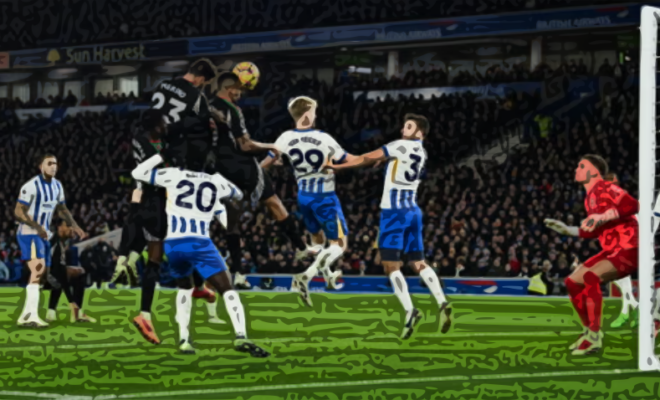Mental Strategies of Elite Athletes Transitioning from Soccer to Pickleball

The transition from one sport to another, especially at an elite level, requires more than just physical adaptation; it demands a significant shift in mental strategies. Athletes who move from a sport like soccer to pickleball often bring with them a wealth of experience in competition, but they must also develop new mental skills to succeed in their new arena. This article explores the mental strategies employed by such athletes, drawing upon insights from the provided sources within the pickleball news arena.
The Importance of a Positive Mindset
One of the most critical mental attributes for any athlete, especially those in transition, is maintaining a positive mindset. Danny Jensen, a former Ohio State soccer player turned pickleball pro, emphasizes the importance of differentiating between bad moments and bad days. He recounts an incident where his car broke down on the second day of filming a reality TV show but maintained that he was still having a good day. This perspective highlights that even when faced with adversity, a positive outlook can help athletes remain focused and resilient. Jensen also stresses that “sometimes people just play really good when they play against you and it’s not just because you’re having a bad day”. This mentality allows athletes to avoid internalizing every loss or setback. He focuses on keeping himself at a steady, less stressed level to improve his performance.
- Key Takeaway: A positive mindset is not about ignoring difficulties, but about understanding that setbacks are temporary and do not define overall progress.
Handling Pressure and Competition
Elite athletes are no strangers to pressure, but the nature of pressure can vary greatly between sports. Ivan Jakovljevic, a former professional soccer player from Croatia who transitioned to pickleball, notes that in soccer, there is a set 90-minute period to win or lose. In pickleball, however, it’s a true win-lose scenario that requires adjusting a player’s mentality. He notes that “a lot of it comes down to who’s spending more time on the court and just being smart in the big moments”. Jakovljevic also acknowledges the need to handle the pressure of knowing that others are always trying to take your place. He emphasizes the necessity of “an unwavering belief in yourself”.
- Key Takeaway: Adapting to the unique pressure of a new sport is crucial. This involves not only believing in oneself, but also being aware of and addressing weaknesses.
The Mental Game of Pickleball
Pickleball, while physically demanding, also has a significant mental component. Jakovljevic stresses that many top players have equal skill and that the outcome of matches often depends on who is mentally stronger in tight situations. He is working on bringing his best to those critical moments. The mental game involves:
- Reading the Game: Jensen says that he was able to read the game well early in his pickleball career, but his skills had to catch up.
- Focus and Concentration: Staying focused and avoiding distractions is essential, particularly in high-pressure situations.
- Self-Talk: Jensen admits to using self-talk to hype himself up during games, saying things like “I can crush him,” though he knows it’s not always accurate and he’s hoping it does not come off the wrong way.
- Learning from Losses: Jensen sees losses as learning opportunities, noting that it is possible to get better even when getting “crushed” by better players. He believes that by playing against higher-level players like Ben Johns and Anna Leigh Waters, he is not quitting but will eventually be able to defeat them. This perspective on losses encourages players to view setbacks as steps toward improvement.
Transitioning Skills and Mindset
Athletes transitioning from soccer to pickleball often find some skills to be transferable, while others need to be developed from scratch. For instance, soccer players often possess excellent footwork. However, hand-eye coordination is an area that needs a lot of work. Jensen admits that the first six months of learning pickleball were frustrating, as he understood what he should be doing, but did not have the skills in his hands to execute those actions.
- Key Takeaway: Acknowledging both transferable skills and skill gaps helps athletes focus on areas that need improvement while building upon existing strengths.
Overcoming “Golden Handcuffs”
The concept of “golden handcuffs,” or being held back by the security of a job that prevents pursuing one’s passions, is a mental challenge many athletes face when considering a career change. Jensen described his experience of being “golden handcuffed” by his medical sales career, which prevented him from fully pursuing professional pickleball. He ultimately chose to “cut the handcuffs” to pursue his passion and encourage others to do the same. This bold move demonstrates the power of taking risks to live a more fulfilling life.
- Key Takeaway: Overcoming the “golden handcuffs” requires a mindset that prioritizes personal fulfillment over financial security. It involves taking calculated risks and embracing the unknown in pursuit of passion.
Conclusion
The mental journey of an elite athlete transitioning from soccer to pickleball is a complex process that requires a positive mindset, the ability to handle pressure, and a willingness to adapt to new challenges. By focusing on these mental strategies, athletes can not only make a successful transition but can also continue to grow and excel in their new sport. The experiences of athletes like Danny Jensen and Ivan Jakovljevic provide valuable insights into how mindset, mental toughness, and a willingness to learn can transform challenges into opportunities for success.


